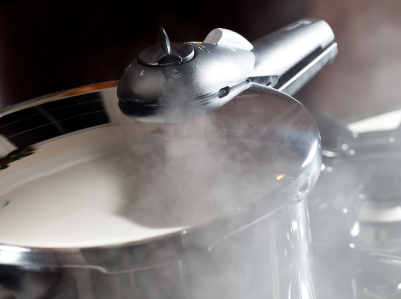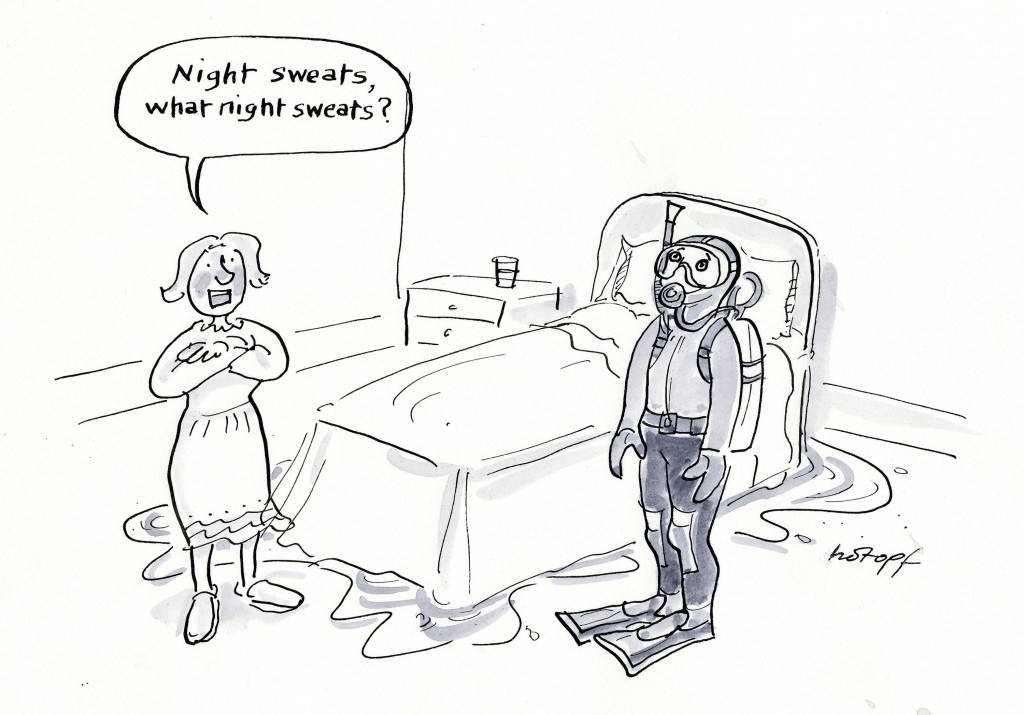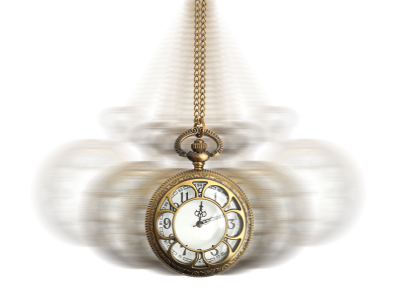Work and the ‘pause: a two way street
Can you believe that three years has passed since I first wrote about Amanda Griffith’s study on menopause and work? The final results are in and they are fairly indicative of the issues that menopause brings to the work environment.
Dr. Griffiths is a professor at the University of Nottingham in the UK. Several years ago, she and her colleagues set out on a journey to discover gender-specific health issues in the workplace other than pregnancy. And, since her target was on women between the ages of 45 and 55, chances are great that the focus would be less on reproductive issues and more on post-reproduction, i.e. menopause. Noting that studies have shown that some women find that their symptoms negatively impact their work life, and that certain work factors, e.g. environment, may increase the intensity of symptoms, Dr. Griffiths also points out that women are generally reluctant to divulge to colleagues or their managers that they are going through menopause. Moreover, even if employers know, what sort of things can they do to help?
Mind you, this study is in the form of an electronic questionnaire and this is the type of design that many will question as introducing bias and issues with recall. However, rest assured, the researchers carefully honed their questions based on an earlier study that was done with a group of women police officers, through one on one interviews with women to discuss the impact of menopause on their health and work and through close review and evaluation by experts in a variety of medical and occupational fields. But enough of the science; let’s get to the meat.
Roughly 900 women were surveyed; about 43% were perimenopausal, 31% in menopause and the rest, on hormones or in menopause due to surgery. Yet, regardless of where they were in their menopause journey, three symptoms were especially problematic when it came to work: feeling less confident, an inability to concentrate and memory issues. Three’s a charm…except when it comes to menopause. The icing on this cake were hot flashes; not only were women unable to control the temperature in their workplace environment (honestly, who does have that ability?!), but having hot flashes became unbearable when the work environments were overly heated or improperly ventilated.
To make a bad situation even worse, over a third of the women said that they worked harder to overcome difficulties so that menopause wouldn’t affect their performance or draw attention to them. Working harder also meant learning the best strategies for coping with their symptoms and worklife. And while, on the surface, this doesn’t sound so terribly awful, can you imagine having to make light of matters, making a list and checking it thrice to avoid mistakes or changing your working hours to hide a condition?!
Managers, take note! What do women want to make their workplace more tolerable? Overwhelmingly, women report that they would be better served if management acknowledged that menopause was a possible health problem and provided more flexible working hours. Better ventilation, air conditioning and temperature control are important. And advice and support? More than 50% of women said that having information and advice from their employers about menopause and coping at work as well as informal support from colleagues would make their work environments more palatable. On the flip side? The researchers say that it might be helpful to explore working women’s attitudes toward their co workers and line managers’ perceptions of menopause; after all, women in the throes of the ‘pause may actually be overestimating others’ abilities to infer menopause status when a hot flash hits and may even have misconceptions about others’ negative perceptions of menopause.
There is no doubt that menopause impacts working ability, environment and relationships. As with any health condition, appropriate support from employers is imperative and may help to reduce stress, help boost performance and insure loyalty. Yet, employers can’t do it alone; women need to be able to communicate their status and their needs. Work and the ‘pause is truly a two way street.
Read MoreMood and the grape
 Drinking wine can lower the risk of developing depression? It seems counterintuitive, doesn’t it, particularly because many studies have shown a direct association between alcohol consumption and depressive symptoms. Yet, Spanish researchers are now reporting that light to moderate drinking might actually yield mood benefits.
Drinking wine can lower the risk of developing depression? It seems counterintuitive, doesn’t it, particularly because many studies have shown a direct association between alcohol consumption and depressive symptoms. Yet, Spanish researchers are now reporting that light to moderate drinking might actually yield mood benefits.
Before you head out to buy a few bottles of your favorite variety, there are a few key things that you need to know. For example, the original purpose of this study was to learn how a Mediterranean diet supplemented with extra virgin olive oil or mixed nuts might help prevent heart disease In roughly 5,000 men and women with existing risk factors. It just so happens that their alcohol intake were part of overall dietary measures. So, when the researchers went back into the data, they divided these drinkers into groups based how much they drank a day, and how often wine was part of that consumption. here’s the rub: while drinking two to seven glasses of wine a week was associated with halving the risk for developing depression, those glasses of wine translated into 5 to 15 grams at most, per day. Do the math; that’s equal to .17 to .5 ounces of wine daily. A half ounce of wine!
The reason for the protection against depression is that it is believed that depression and heart disease may share the same underlying mechanism. What’s more, wine contains certain non alcoholic components, resveratrol for example, that may protect wine drinkers from developing depression. Still, the same benefits are not seen when the amount of wine consumed daily exceeds a half ounce.
The lesson is clear: the headlines might be promising but don’t always deliver the goods. Meanwhile, I am a huge believer in the power of the grape, even if it doesn’t promise to boost my mood.
Cheers!
Read More
Wednesday Bubble Recap: Today’s Stress, Tomorrow’s Disability
Some of you may have noticed that I’ve been gone from Flashfree for a week now. I was attempting to take a staycation. Unfortunately, that attempt fell short of expectations. Sure, I didn’t turn off like I promised myself that I would. However, when the train leaves the station without a schedule, sometimes you simply have to hop on. And hence, I found myself hopping on at odd stops other than finding a path of true avoidance. And it’s left me feeling one way: stressed.
I was hoping to hop back on the Flashfree wagon full steam today with some interesting novel twist on the ‘pause but rather, I decided to repost this piece from earlier in the year. It can be hard to shut life down at times but the ramifications are pretty clear.
I’m planning on taking a day or two to remind myself. What about you? What’s your stress quotient like? If it’s out of control like mine and you are finding yourself barely coping at times, it’s probably an excellent call to step back and just stop. At the end of the day, the long term effects are more important than the short term reasons for the stress.
Mental stress takes its toll in so many ways; from depression and mental exhaustion to memory issues, sleep disruption, and reduced quality of life, to heart disease, diabetes and possibly musculoskeletal disease, stress literally sucks the life out of an individual. What’s more, while stress may’ take no prisoners,’ but its effects are not uniform and actually vary from person to person. As I’ve written previously, factors such as active coping and attitude are as important as a lack of control over one’s work environment. However, what about long-term consequences? According to a recent paper published online in the Journal of Gerontology, little has been written about the long-term consequences of mental stress and its toll as we grow older. And, the few studies that have examined it have actually been relatively short.
Fortunately, that paradigm has changed, In fact, when researchers examined the association between self-perceived stress and its later toll in roughly 5,500 men and women, the picture they found was not pretty. Stress symptoms were first evaluated when participants were between the ages of 45 and 58 and then reexamined four years later. They included factors such as stomach or chest pain, dizziness, anxiety, lack of enjoyment, sleep issues, lack of energy and a gloomy outlook, which were rated by frequency. Twenty-eight years later, daily living scales were used to assess the degree of disability in the same individuals; these included the ability to feed oneself, to dress, to get out of bed, prepare meals, shop, do laundry or do housework.
As mentioned, stress was inconsistent among the participants; some were profiled as having mostly negative reactions to work and depressiveness while others perceived a decline in their ability to focus and think. Some participants primarily reported sleep disturbances or physical symptoms such as chest pain, stomach ache and dizziness. Only a third reported having no stress symptoms in midlife, whereas up to a quarter reported that their stress was constant. Most importantly, constant stress in midlife was linked to significant challenges in performing the most basic of activities later in life — up to four times worse. Even more troubling? Constant stress was a deal breaker when it came to physical activity; these people had up to three times greater risk for not being able to walk a mere 1.2 miles!
Researchers say that it’s likely that “constant activation of stress responses lead to ‘wear and tear.” And while the health trajectory that leads from stress to disability is still unclear, what is clear is the need to intervene in midlife, take time to identify work stressors, change workloads and tasks, engage in regular physical activity and seek counseling if stress symptoms continue to interfere with life quality.
You only live in this body once; be sure to take care of it at all stages before lack of care takes a real toll.
Read More
Wednesday Bubble: Time for some scuba gear!
Readers:
I am on holiday through Labor Day so today, I leave you with a link to the archives; the topic is night sweats!
Hopefully, you’ll find some gems and your partner can lose his scuba gear!
Cheers!
Read MoreNewsflash: Ethnic, flashing and menstruating. Three’s a charm?
 Sounds too awful to be true. However, a study of an ethnically diverse group of women has shown that having regular periods, which, theoretically indicates that hormone levels are more on par than their menopausal sisters, may not be all that they are cracked up to be. In fact, among approximately 1,500 women (mean age 48.5), 54% reported having had either hot flashes (~33%) or night sweats (~46%) at some point and recently, anywhere from 17% (hot flashes) to 26% (night sweats). Moreover, it appeared that Black and Native American women were most vulnerable, while Asian women were the least. The numbers among white women were only slightly lower than their Native and Black peers.
Sounds too awful to be true. However, a study of an ethnically diverse group of women has shown that having regular periods, which, theoretically indicates that hormone levels are more on par than their menopausal sisters, may not be all that they are cracked up to be. In fact, among approximately 1,500 women (mean age 48.5), 54% reported having had either hot flashes (~33%) or night sweats (~46%) at some point and recently, anywhere from 17% (hot flashes) to 26% (night sweats). Moreover, it appeared that Black and Native American women were most vulnerable, while Asian women were the least. The numbers among white women were only slightly lower than their Native and Black peers.
What’s so interesting about these data is that typically, obesity has been associated with a self-reported increase in vasomotor symptoms among menopausal women. However, in this group of women, the researchers deliberately adjusted their findings for BMI and age, and they did not find that association. In fact, when they looked at Hawaiian/Pacific Islander women, who had, on average, the highest BMI of all the ethnic groups studies, only 45% reported ever having a hot flash or night sweat, compared to 58% of white women (who had some of the lowest BMIs amongst the group).
Why it matters…
Many women operate under the assumption that it won’t happen to them. Cancer won’t happen. Losing a spouse won’t happen. Having a hot flash or night sweat while still menstruating won’t happen. I refer to that as the ‘teenage mindset,’ since we all know that teenagers are among the most prone to the ‘won’t happen to me’ syndrome. And yet, the data suggest otherwise; even before menopause starts, a hot flash can occur. And it can be bothersome; of the entire group of women who said that they had had some sort of vasomotor event in the prior two weeks, anywhere from 38% (Asian women) to 80% (Hawaiian/Pacific Islander, Native Americans) said it was at least moderately bothersome. White and Black women fell in the middle.
I cannot emphasize it enough; early action is the best action. Don’t wait until you are in the throes of menopause; start now to boost your preventive strategies, whether they entail isoflavones, hypnosis, yoga or acupuncture. I am all for curtailing the worst wherever possible; shouldn’t you be?!
Read More
Wednesday Bubble: Sexual health and hypnosis
You’re getting verrrrrrry…
turned on?
According to a newly reported study during this month’s American Psychological Association Annual Meeting, hypnosis might be the very thing to improve sexual desire and satisfaction.
If you step back, it does make sense. As I’ve written previously, hypnosis may help alleviate the frequency and severity of hot flashes. Think about it: fewer flashes may lead to better sleep and less stress. Both may beget a greater interest in being close, since hot flashes have been alleviated. According to the lead researcher, Dr. Gary Belkin, the warmth from closeness can trigger a hot flash, although admittedly, this is the first I’ve heard of it.
Still, the study, which examined the effect of hypnosis, appeared to suggest significant improvements in overall sexual health. 187 postmenopausal women participated in five weekly hypnosis relaxation sessions in which they received direct and indirect suggestions for relaxation, coolness and mental imagery or structured attention sessions that entailed supportive counseling. They also rated sexual desire and pleasure, symptoms and the degree to which hot flashes appeared to interfere with sex both at the beginning and end of the study.
Elkins reports that after 12 weeks, hypnotic relaxation therapy appeared to significantly improve sexual satisfaction and pleasure and decrease discomfort. And while he acknowledges that postmenopausal sexual health can be affected by factors other than hot flashes, e.g. fatigue, self esteem, partner’s health and the quality of the relationship, the positive effects of hypnosis warrants more research.
Meanwhile, perhaps self-hypnosis can help get those juices flowing again? Who knows?
Read More
Guyside: Reach for the middle!
It’s easy to reach for the top. We’re almost mandated to do it, right? Nike told us: “You don’t win silver, you lose gold.” Vince Lombardi exhorted: “Winning isn’t everything, it’s the only thing.” Steve Jobs said: “We don’t get a chance to do that many things, and every one should be really excellent. Because this is our life.”
I think men have a particular cultural script that says “more, bigger, better, faster.” It’s powerful. And the tech revolutions of the world have led to startups where the goal seems to be to work harder, pull the allnighters, and generally devote yourself, body and soul, to pursuing your ambition.
Not to say that ambition is bad. But over the last few years, I’ve made decisions — and some decisions have been made for me — that have started to make me think that perhaps we don’t give being average enough credit. Let me tell you a story about a guy who, as a kid, was pretty much the worst sportsman you could imagine.
This guy wasn’t … OK, let’s say it “I wasn’t… much of a skater. Or a baseball player. Basketball? Oh, man. Hopeless. I was pretty tall. But my teenage limbs made me look like a stick insect, and I was about as coordinated as a used-car salesman’s suit. I was pretty much the death of any sporting event I was press-ganged into during phys-ed class. It took me until my thirties to find a sport that I could be passionate about.
I was working at a university about 5 miles from where I lived, and parking there was quite expensive. And, my new house was just a few hundred yards from a network of bike paths. So I bought a used bike from a friend and became a cyclist.
Well, technically, I became a commuter. Becoming a cyclist came later. What I discovered was that I really enjoyed the riding part. There weren’t traffic jams to contend with. I remembered how free and fun it felt to ride a bike when I was a kid. Sometimes, the weather was not so great. And that was anywhere from unpleasant to nasty to… exhilarating. There was a certain joy in pounding your way home in a sudden rainstorm. Once you got to a certain level of wet, it didn’t matter anymore.
That first commuter bike died a sad death when its frame broke, a mortal injury. So I got another one. Then I heard about a local cycling club’s “Rideau Lakes Cycle Tour,” and decided to try training for a two-day, 230-mile ride.
I put on spandex for the first time. Then I went outside wearing it for the first time. I went from the upright-position hybrid bike to my first road bike. I took a group riding course from my local cycling club and started going out on the weekends to ride. I bought clipless pedals and learned how to ride while bolted to my bike. Commutes became kickoffs to longer early-morning or afternoon rides.
I got to the point that when I went home to visit my family, I found someone who would loan me a bike, got my dad to drive me to the bike, then spent the rest of the vacation taking beautiful summer morning rides.
And for the last 10 years or so, cycling’s been my thing. I can ride 30-50 miles without much forethought; the century (100 miles) is a little bit of a challenge, but not like climbing Mount Everest. But all that is not to say that I’m a good cyclist. Hell no. Let me enumerate the ways in which I’m not a good cyclist.
- My iffy fitness regime means that my hill-climbing ability is awful. In the Tour de France, the “King of the Mountains” wears a polka-dot jersey. They oughtta give me prison stripes.
- I’ve never raced. Never felt the thrill of sprinting past the pack and crossing the finish line in a criterium (closed-streets race on a relatively short track). By the time I started riding, the romance of racing was outshouted by the reality of crashing.
- I possess neither the finances to spend thousands of dollars on the most high-tech components possible to reduce the bike’s weight by a few ounces, or the willpower to reduce my weight by a few pounds, both of which would make me faster on the bike.
- My cycling wardrobe tends to jerseys with Sesame Street characters or illustrations of hamburgers on them, rather than team kit.
- I might go a week without a long ride. Sometimes two.
- In Ottawa, the snow begins in November and the roads clear in March or April. My indoor training regimen is … spasmodic at best.
That’s just a start. And you know what? I don’t care.
One of the things I’ve come to learn is that I don’t mind being a bad cyclist. There’s something to be said for riding slow, and for accepting that the young turk on the $7,000 bike (yeah, that’s not even the top of the top-range) is going to smoke me going up or down the hills of Gatineau Park.
I enjoy going 15 miles an hour as much as I would going 25. I enjoy the feelings of cycling, either alone or with friends, and I enjoy the sensations. Dedicating my life to becoming a top-notch cyclist wouldn’t make me enjoy it more. In fact, it might reduce my enjoyment.
Life is full of things we have to do: obligations. At least mine is. I don’t need to turn a thing I love into another one of those obligations. There’s a joy to being okay at something. And if you’re pushing yourself in one or more aspects of your life, maybe there ought to be room in your life for something you’re … just okay at.
I have tons of friends who are marathoners, triathletes, hockey players, basketballers, and the like. I regularly applaud and admire the ones who are “serious athletes” or “competitors.” But I’m not one of those. And you know what? I’m pretty much okay with that.
Dare to be average. You might just like it.
Photo: Creative Commons licenced by Flickr user Fil.Al, used with permission.
Read More











